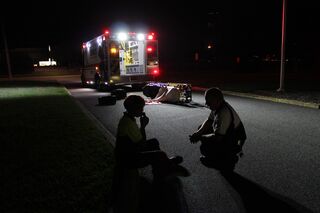Trauma
Should Trauma Illness Be Treated as Moral Injury?
Perhaps all traumatized people are also morally injured.
Posted December 12, 2022 Reviewed by Hara Estroff Marano
Key points
- Trauma illnesses and moral injuries are though to be different responses to trauma having distinct symptoms.
- Standard treatment of trauma illnesses leaves half to two-thirds of people still symptomatic after treatment.
- Trauma illnesses also have moral injury components, since life events are filtered through moral appraisals.
- Suffering in both trauma illness and moral injury requires that moral identity and personality changes be tackled in psychotherapy.
Traumatic illnesses like post-traumatic stress disorder (PTSD) and moral injury are both responses to trauma. They may follow different and distinct pathways in elaborating harm and symptoms.
Trauma and Moral Injury Symptoms
Litz et al. say PTSD is a psychiatric disorder with traumatic events creating fear and hopelessness. The main concern is personal safety. This leads to hyperalertness of the nervous system with classic symptoms of re-experiencing, avoidance, increased arousal, and negative mood changes (DSM-5).
Both Litz et al. and Drescher et al. find that moral injury is not pathological, not an illness, but a human response to moral upset and betrayal. Moral injury produces guilt, shame and anger, they say. It lacks nervous system hyperactivation. The main concern with a moral injury is trust—of oneself or others, says J. Shay.

How to Separate Trauma Illness from Moral Injury
Barr et al. find overlap, with people experiencing trauma illnesses like PTSD, and moral injuries simultaneously. Both PTSD and moral injury are provoked by moral stressors.
Barr et al. find that determining which insult a person suffers must be gleaned over time and not by examining specific predating events that appear to be traumatic. They postulate a dual process model of traumatic injury and moral injury. Their model proposes ways in which trauma illnesses and moral injuries are both similar and different. They look at exposure to potentially injurious events; symptoms in biological, psychological, social, religious, and identity spheres; role appraisal—whether perpetrator, victim, or witness; and treatment interventions.
Barr et al. say that in traumatic illnesses like PTSD, the danger of the event and the world are evaluated by the sufferer. Yet, for moral injury the evaluation is of the “moral self and the standard-bearers of the moral order.”
Treatments
Barr et al. describe three main treatments for sufferers of traumatic illnesses. One is cognitive processing therapy (CPT)., a variant of cognitive behavior therapy (CBT) that focuses on altering beliefs related to trauma.
A second treatment is prolonged exposure treatment. It is also a type of CBT that helps people with their fears and avoidance of events and activities related to their trauma.
The third treatment is eye movement desensitization and reprocessing (EMDR), which helps process memories of traumas to a resolution of the distress experienced in affect, cognition, and arousal.
Even with the three treatment modalities being used, half of PTSD sufferers fail to respond to treatment. If the trauma is from war, two-thirds of PTSD sufferers continue to have their diagnosis and symptoms, even after one or all of the three treatments have been tried.
People may not benefit from these treatments, Barr et al. say, because they also suffer with moral injuries that create character and identity dissonance. A “rebuilding of one’s damaged identity and character” needs to occur after experiencing a moral injury.
Raising a New Question
Could it be that all trauma illnesses also have moral injury components? Are we making too much of their differences and not enough of their similarities and continuities? If so, it might mean that anyone suffering with a traumatic illness needs close examination of their moral identity and personality style in order to get well.
Traumas evoke an out-of-sync appraisal of self and others, whether with an improvised explosive device in combat, sexual assault, violent tornado, or street mugging. Such victims experience a turned-upside-down puncture to their worldview and its moral underpinnings. They are in flux about who they are and who or what is the cause of their distress—themselves or others? Where does the blame lie for the trauma?

Personality Differences in Moral Injury
In 2019, Papazoglou et al. explored personality differences in police suffering moral injuries. They found “self-focused” moral injuries of compassion fatigue and PTSD in those with personality traits of high narcissism, high self-absorption, low altruism, and low compassion. For the “self-focused,” morally injurious episodes were perceived as ego betrayals or injuries to their narcissism.
In their study, they also discovered “others-focused” moral injuries in police officers who showed greater compassion for others and felt others or themselves had been wronged morally because of exposure to human suffering.
Papazoglou et al. concluded that “personality traits should be considered when trying to understand and treat police trauma.” Perhaps treatment in both trauma illnesses and moral injury should focus on personality structure and roles.
Treating Moral Injury and Altered Views of Self and Others in Trauma Illnesses
In a 2012 publication, “Beyond Attachment: Psychotherapy with a Sexually Abused Teenager,” I explored creating personality change in treating a sexually-abused teenager. I treated her with dynamic psychotherapy. She suffered PTSD and also experienced a challenge to an altered concept of her worldview as to what was moral or immoral, right or wrong, as a result of her trauma.
Prior to her trauma, being an upstanding, good and moral person meant acquiescing to what adults expected of her. When she had to say no, and no longer agree to sex abuse by a close adult, she ran headlong against her own moral standard of never disappointing an adult.
This moral clash created PTSD symptoms and also a moral injury, a worldview turned upside down. She questioned who and what were good and bad with her altered life scenario and actions. Was she good (moral) or bad (immoral) for blowing the whistle? Would she have been “good” for pleasing her abuser or was she “good” to protect herself and stop something that compromised and traumatized her?
Her treatment explored the harmful aspects of a personality style attempting to always please others. The goal of psychotherapy was to attenuate and reorient her existing personality style, not to return to her prior personality functioning.
Perhaps all traumatized people are also morally injured. Isn’t everything that happens to us in life filtered through moral evaluation of ourselves and others? Victims may need both personality exploration and personality change to become affectively and cognitively well. They need to evolve a better psychological footing for themselves that allows them to be inoculated against suffering with future traumas.
References
Adams, C.B.L. (2012) Beyond attachment: Psychotherapy with a sexually abused teenager. American Journal of Psychotherapy, 66(4), 313-330.
American Psychiatric Association (2013) Diagnostic and statistical manual of mental disorders (5th ed.). Arlington, VA: Author.
Barr, N., Atuel, H., Saba, S., & Castro, C.A. (2022), Toward a dual process model of moral injury and traumatic illness. Frontiers in Psychiatry, 13:883338.
Drescher, K.D., Foy, D.W., Kelly, C., Leshner, A., Schutz, K., & Litz, B. (2011), An exploration of the visibility and usefulness of the construct of moral injury in war veterans. Traumatology, 17(1), 8-13.
Litz, B.T., Stein, N., Delaney, E., Lebovitz, L., Nash, W.P., Silva, C., & Maguen, S. (2009), Moral injury and moral repair in war veterans: A preliminary model and intervention strategy. Clinical Psychology Review, 29(8), 695-706.
Papazoglou, K., Blumberg, D., Briones-Chiongbian, V., Russo, C., & Koskelainen, M. (2019), Exploring the roles of moral injury and personality in police traumatization. Crisis, Stress, and Human Resilience: An International Journal, 1(1), 32-56.
Shay, J. (2014), Moral injury. Psychoanalytic Psychology, Vol 31, No.2, 182-191.




